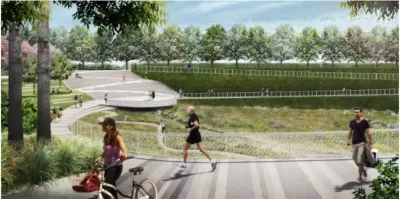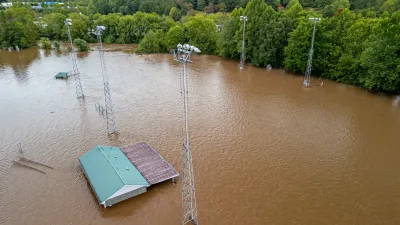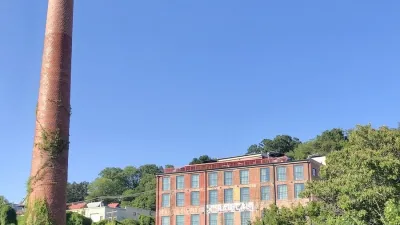As hurricane seasons get more destructive, a less reactionary approach to stormwater infrastructure investment may be needed.

"Disasters like Hurricane Florence and Hurricane Michael only represent a small taste of the expected rise in daily flooding and other chronic environmental threats we're going to face in years to come," Joseph Kane writes. And "reactive" approaches to maintaining current legacy systems will only take us so far.
Kane argues that a more proactive approach to resilience investments is needed, one that incorporates greener, longer-term fixes and accounts for the full economic and social benefits those projects could confer. "Green infrastructure projects like rain gardens can be smaller, more distributed, and efficient over time," he writes. "The immediate returns of these projects may be less clear, relative to the upfront costs, but the reduced runoff, treatment needs, and pollution loads can lead to greater savings."
Current approaches, Kane says, are both reactionary and isolated from other potential positive factors. "We do not adequately account for the costs of inaction that we face from failing stormwater infrastructure, nor do we account for the broader social benefits of more proactive repairs. Workforce development, for instance, can be a central element in this approach."
Capturing the costs of inaction and the full scope of benefits, he says, could lead to more opportunities to utilize ESG investments and social impact bonds, for instance.
FULL STORY: The US needs a new approach to invest in resilient infrastructure and communities

Maui's Vacation Rental Debate Turns Ugly
Verbal attacks, misinformation campaigns and fistfights plague a high-stakes debate to convert thousands of vacation rentals into long-term housing.

Planetizen Federal Action Tracker
A weekly monitor of how Trump’s orders and actions are impacting planners and planning in America.

In Urban Planning, AI Prompting Could be the New Design Thinking
Creativity has long been key to great urban design. What if we see AI as our new creative partner?

King County Supportive Housing Program Offers Hope for Unhoused Residents
The county is taking a ‘Housing First’ approach that prioritizes getting people into housing, then offering wraparound supportive services.

Researchers Use AI to Get Clearer Picture of US Housing
Analysts are using artificial intelligence to supercharge their research by allowing them to comb through data faster. Though these AI tools can be error prone, they save time and housing researchers are optimistic about the future.

Making Shared Micromobility More Inclusive
Cities and shared mobility system operators can do more to include people with disabilities in planning and operations, per a new report.
Urban Design for Planners 1: Software Tools
This six-course series explores essential urban design concepts using open source software and equips planners with the tools they need to participate fully in the urban design process.
Planning for Universal Design
Learn the tools for implementing Universal Design in planning regulations.
planning NEXT
Appalachian Highlands Housing Partners
Mpact (founded as Rail~Volution)
City of Camden Redevelopment Agency
City of Astoria
City of Portland
City of Laramie





























